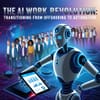The landscape of work is undergoing a dramatic transformation, driven by advancements in artificial intelligence. As businesses increasingly turn to automation, we are witnessing a shift away from traditional offshoring practices, fundamentally changing how work is performed.
In the past, companies often sought to reduce costs by moving jobs to countries with lower labor expenses. Offshoring allowed businesses to access a global workforce, but this approach has its limitations. Communication barriers, time zone differences, and quality control issues often arose, complicating operations.
Today, AI is reshaping this dynamic. Automation technologies are enabling organizations to streamline processes, improve efficiency, and reduce reliance on human labor for repetitive tasks. By integrating AI into their operations, companies can achieve significant cost savings while maintaining quality and consistency.
This shift has significant implications for the workforce. As routine tasks become automated, the demand for low-skilled labor may decrease. However, this does not mean that job opportunities will vanish. Instead, there will be a growing need for workers who can engage with AI technologies, manage complex processes, and focus on higher-level tasks that require critical thinking and creativity.
Education and reskilling are becoming essential in this new landscape. Workers must adapt to the changing demands of the job market, acquiring new skills that align with AI integration. Companies and educational institutions play a crucial role in facilitating this transition by providing training programs that prepare employees for the future of work.
Furthermore, the rise of automation brings about ethical considerations. As machines take over certain tasks, questions arise regarding job displacement and the responsibilities of employers to their workforce. It is vital for businesses to approach this transition thoughtfully, ensuring that they support their employees during this period of change.


